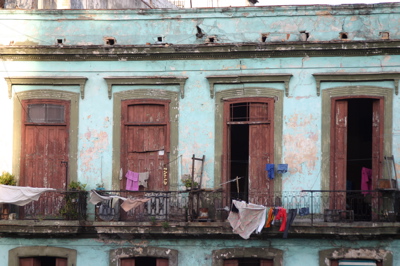Our trip was great – an experience I find hard to explain. People ask us, “How was Cuba?” – a fairly straightforward question, but the answer isn’t as simple. I’ve never been anywhere quite like Cuba, a place that can be at once beautiful and awful, inspiring and depressing – a study in contradictions at every turn. The architecture is amazing, but crumbling. There are excellent doctors and hospitals, but not enough medicine. There are modern bus stops, but many are serviced by horses pulling carts. And worst of all is a government that promised freedom but delivered a different kind of slavery. True, the revolution in 1959 gave Cuba freedom from outside rule for the first time after hundreds of years of repression and many failed revolutionary attempts. But now the repression comes from Fidel Castro, one of their own. Many would argue that life is better now for most ordinary Cubans than it was before the revolution, but it was clear – at least from our experiences – that all things are not well, and change has to be on the horizon.
Lee and I were driving to the Savannah airport early Tuesday morning when we turned on our local NPR station. The first story we heard was about Fidel Castro’s resignation. “You’ve got to be kidding me,” was all I could think. I hadn’t been scared about traveling to Cuba, but this gave me pause. How would the Cubans react? I was relieved when we met up with our traveling group and I saw them all laughing, joking, and relaxed. They told me what I now believe to be true – that meaningful change in Cuba will take time, and won’t likely happen until Fidel and Raul are dead and can no longer threaten people with retribution for new ideas. In fact, once we got to Cuba, the few times Cubans seemed willing to talk about politics, they were more interested in discussing Barack Obama then Raul Castro. They all want to know when and if the U.S. embargo might be lifted.
We spent one night in Miami, and the Wednesday we left for Cuba, this was hanging from our hotel room door:

The Miami Herald with it’s blazing headline of uncertainty in the wake of Castro’s announcement. Great. Fan-freaking-tastic.
Our group chartered a plane from Miami to Havana, with 14 of us from our church and about 30 from our local Jewish synagogue. The flight was fine, customs was a breeze (much easier than usual, I’m told), and soon we were riding through the streets of Havana headed toward the Hotel Plaza. I was first struck by the billboards at the roadside. None were advertising any products for sale, which makes sense in the absence of capitalism. Instead, they were part of Castro’s propaganda machine. Three-quarters of them were pro-revolution, pro-Castro, pro-socialism slogans and images. The faces of Fidel and revolutionary hero Che Guevara were everywhere. The other quarter were anti-American and anti-Bush. Even though I’m very unhappy with our current administration, it was still a little shocking to see a picture of my president on a billboard with the word “Terrorist!” emblazoned beside it.
I began to really worry about how the Cuban people would treat us, but my concern was unfounded. No one ever seemed openly hostile toward us, and several people even seemed excited to meet Americans. We met two different Cubans with family living in New Jersey, and because they’re usually so cut off from the U.S., I think they were happy to meet people who live in the same country as their loved ones.

Because the Cubans have so few interactions with Americans, and because the anti-American messaging is so prevalent, I felt a strange sense of responsibility to make a good impression. Most of the time that wasn’t an issue, but there are plenty of people there looking to make a buck off of tourists, and my naivety allowed us to be taken advantage of a few times. But most people we met were kind and welcoming, and for that I am very grateful.
We spent a couple of days in Havana, and in addition to attending a few church services with the group, Lee and I used the opportunity to wander around town and take it all in. To be honest, I was shocked by the conditions these people must endure. I’d been reading about Havana, and the writing described the city’s wonderful old buildings in a very romantic way. True, there was evidence that these old buildings were once wonderful, with ornate carvings in the edifices and grand entrances and marble staircases. But they didn’t seem romantic to me at all. They were falling apart, neglected, crammed with people and in such disrepair. Balconies had caved in. Doors were rotting away. Communism provides homes for everyone, but these houses made Savannah’s worst projects look pretty good.
For example, this is Cuba’s Capitol building (modeled after our own), which has been restored and is actually quite beautiful:

But this is across the street. People live here. We watched a woman take her laundry off the clothes line across her balcony.

Dilapidation could be seen everywhere.

Yet, tourist accommodations are quite nice. This was our hotel – a wonderful old building overlooking a city square.

But it was hard to feel cozy amid the surrounding conditions. Instead, I felt guilty. Ordinary Cubans aren’t even allowed into this hotel. Men guard the door, watching all who come and go, stopping any locals from entering. Obviously, this is a point of contention for many Cubans.
This was the view from the upper terrace of our hotel, looking out over the neglected city.

There is so much more I want to write about our trip, but I need to go to bed. I knew I couldn’t get it all written in one night. More to come.

